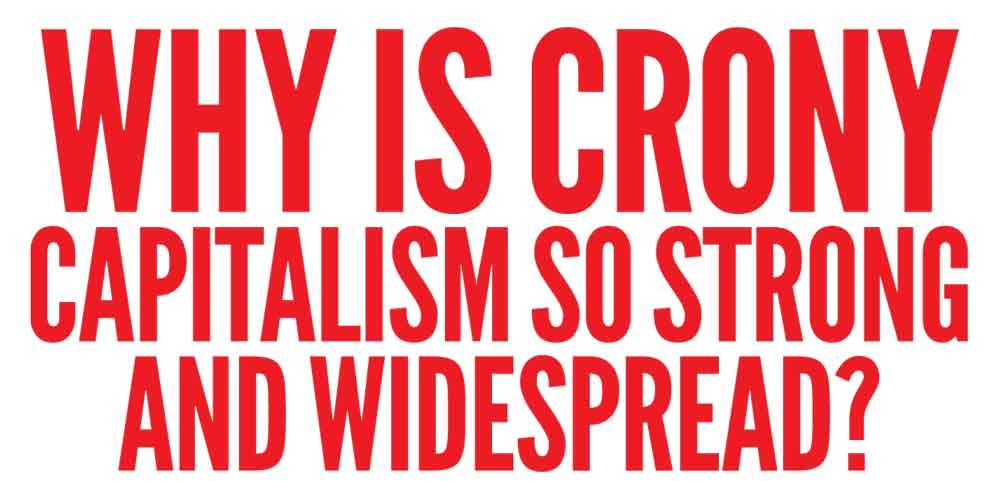10 Dec 2024 - {{hitsCtrl.values.hits}}

 Crony capitalism is widely and publicly derided as the worst form capitalism. It is considered to be injurious to the long term prospects of an economy and also to the welfare of the masses. And yet, it is a widespread phenomenon in the Global South.
Crony capitalism is widely and publicly derided as the worst form capitalism. It is considered to be injurious to the long term prospects of an economy and also to the welfare of the masses. And yet, it is a widespread phenomenon in the Global South.
The main reason is that crony capitalism meets the need for investments in capital-starved countries in the Global South, says Stanford University political scientist and historian, Stephen Haber.
|
Stephen Haber
|
Crony capitalism is seen as a source of bribes, of funds for electioneering, and of black money for political leaders who are in politics mainly to line their pockets. It functions as an engine for the parallel economy.
In his introduction to The Political Economy of Crony Capitalism (https://www.hoover.org/sites/default/files/uploads/documents/0817999620_xi.pdf) Haber says that crony capitalism is frequently offered as an explanation for the inefficiencies of economic systems in the developing world. But the phenomenon has its functions, he argues.
Haber asks the following basic questions: Why do crony economic systems come into being? If crony capitalism is bad for growth, then why has it survived for so long?
Crony capitalism is defined as a system in which those close to the political authorities (politicians who run the government at any given point of time) receive favours that have large economic value. These favours allow the politically connected economic agents to earn returns or profits above those that would prevail in an economy in which the factors of production are priced by the market and not by political leaders.
Cheap Credit
The pre-eminent factor of production in the case of crony capitalism in the Global South is capital or credit, more precisely, cheap credit. In India, cheap credit is obtained by crony capitalists from the Scheduled Commercial Banks (SCB) as well as State Banks (SBs) through political contacts. Cheap credit, thus obtained, is funnelled into their enterprises.
Even private banks can be induced to provide credit to politically- backed capitalists if these banks get some sort of economic entitlement from the government.
Rules are broken or bent to enable this tripartite alliance of the crony capitalist, the politician and the banker to exist.
Haber says that crony capitalists are not only given cheap credit but also the freedom to charge higher prices for their products when they hit the market. Such prices could not be charged under regular competitive market conditions. In case there is international competition in regard to a product made by a crony capitalist the crony capitalist could ask for and get trade barriers to be put up.
Stephen Haber sees a link between licensing and crony capitalism. If the system in a country requires firms to obtain licenses to import certain key inputs, a friendly government could use the selective award of licenses to create crony capital monopolies, and enable the crony capitalists to go for the kill unhindered by competition.
The government expects the crony capitalist (well-stocked with cheap credit), will invest in industries. This releases the State from the responsibility of investing in enterprises or managing them. The task of investing in enterprises and producing goods and services is left to the crony capitalist. He, rather than the State, boosts the country’s GDP, provides products to the masses, and gives jobs to people.
Governments in countries in which corny capitalism thrives use the money collected through taxation from the people to fund crony capitalists. If a bank come under strain, and has too many Non-Performing Assets (bad loans) the government pumps in money to keep the banks afloat. The bulk of NPAs in banks are in the names of crony capitalists.
The political leadership also gains from the crony capitalist system as crony capitalists use a part of the money doled out by the State or secured from the bank, to bribe the politicians. Obliging bank officials both in the State and the non-State banking sector may also get paid. The system is corrupt to the core, but it keeps the economy humming.
In advanced countries, the system that prevails is described by Stephen Haber as “Limited Government.” He says that in this system, the role of the political leadership in the running of the economy or the market place is limited to maintaining ethical and legal standards. Scope for the growth of crony capitalism is limited in such economies.
In the US, for example, there are institutional checks and balances and political leaders are subject to them, which prevent the emergence of crony capitalism.
But in many of the countries of the Global South, power resides either in a single individual leader or a cabal. It is these people who take the critical decisions and share the loot. Anybody asking questions will be dealt with sternly. The Global South is a fertile ground for the growth of crony capitalism, as many of these countries are either full-fledged autocracies or are elected autocracies. Their economies are marked by paucity capital and governmental inability or unwillingness to invest and run industries. Governments here hand over these functions to crony capitalists who pay bribes, take charge, and make hay while the sun shines. Change of government does not make a difference to crony capitalists who will strike similar deals with the new men in power.
However, Haber says that from the point of view of economic growth and distribution, crony capitalism has drawbacks. It encourages the misallocation of resources. The crony capitalist may invest in sectors which are money spinning but not useful for the economy or society as a whole. If rent seeking becomes the main aim, industries that should not exist, come into existence. “Rent seeking” occurs when a businessman seeks to gain wealth without making any contribution to the benefit of society. “Rent” in rent seeking is based on the economic definition of the term, which is defined as economic wealth obtained through shrewd or potentially manipulative use of resources.
With rent seeking becoming the predominant aim of businesses, monopolies and oligopolies will come up in industries that deserve competition. Opportunities will be denied to entrepreneurs who have the required skills and assets but not the political access or protection required.
Crony capitalists and their political contacts tend to have short-term horizons. This causes cronies to demand high rates of return even for projects that have short maturities. Crony capitalism may, in fact, completely discourage long-term investments.
Since making money by shortcuts is the main aim, products are sold at high prices. Thus, the retail customer, the common man, bears the entire burden, while the crony capitalist and his political benefactors mint money.
Banks, especially, State-owned banks in India have been badly affected by the Non-Performing Assets (NPA) relating to crony capitalists. In the last five years, Indian Scheduled Commercial Banks (SCBs) have together written-off nearly INR 10 trillion worth of bad loans, says Presenjit Bose, an economist and activist based in Kolkata (see: https://www.theindiaforum.in/economy/freebie-capitalism).
The bulk of the reduction of NPAs in the present government’s tenure has occurred through “write-offs”” and not through “recoveries,” Bose points out.
Data show that during the 2024-2014 Congress regime, for every INR 100 of Non Performing Assets accretion in the Scheduled Commercial Banks INR 63.34 were recovered and only INR 8.62 were written off. But under the Bharatiya Janata Party rule, only INR 31.65 was recovered for every INR 100 of NPA accretion, while write offs were at INR 39.38, Bose says.
By March 2015, almost three quarters of the NPAs were on account of large corporate borrowers, Reserve Bank of India Deputy Governor Vishwanathan had said.
Without large-scale taxpayer-funded bailouts, many of the Public Sector Banks would have breached the capital adequacy ratios because of losses on account of such write-offs, Bose said quoting the Reserve Bank of India report of 2021.
Public Sector Banks accounted for the majority of the write-offs, representing nearly 63% of the total. The banks retain the right to pursue recovery from borrowers, but actually, this option is not pursued, Bose points out.
22 Dec 2024 1 hours ago
22 Dec 2024 2 hours ago
22 Dec 2024 4 hours ago
22 Dec 2024 4 hours ago
21 Dec 2024 21 Dec 2024